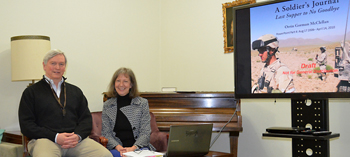| Search PNC News for stories of people and churches in our UCC Conference: |
|---|
Adult forum reflects on impact of war on vets
For four weeks Mary Rupert of Westminster Congregational UCC in Spokane and Larry Shook a Vietnam war vet shared the journal of Orrin Gorman McClellan, a Whidbey Island boy who signed up for the army after high school, expecting to get an education and have a grand tour.
 |
Larry Shook, Vietnam vet and Mary Rupert, member of Westminster Congregational UCC in Spokane, lead an adult forum to build awareness of vets’ experiences. |
His words in “A Soldier’s Journal: Last Supper and No Goodbye” tells of his training, his serving in Afghanistan and his coming home, suffering post traumatic stress disorder.
Orrin helped his parents start the Whidbey Island Veterans Center. Even after he committed suicide July 5, 2010, his words raise questions about everyday experiences in war.
Mary said his journal captures a “poignant, heart-breaking journey” that helps people raise questions about “how we can welcome vets home and what we can tell young people about the realities of war.
She believes “we share a burden with veterans.”
“We need to let young people know what war is about. It’s not just about patriotism and fighting terrorism. We need to believe it’s possible to have peace on earth, just as people ended slavery and won civil rights,” she said.
Larry said that “as a society, we need to stop lying to ourselves about war and stop leaving soldiers and their families alone with the devastating truth about what war does to them. It shatters them so badly that many kill themselves. Three times more Vietnam vets killed themselves than were killed in the war. We now lose 18 times more soldiers to suicide than to enemy fire.
“As citizens, we are responsible for those casualties,” he said. “America is killing its own. There’s no way to romanticize this wanton slaughter of our own citizens.
“The public needs to understand that PTSD is not confined to traumatized soldiers. It’s a contagious disease. Family members are being diagnosed with primary PTSD because they are infected by the stress. PTSD destroys relationships. There is a growing epidemic of suicide among spouses, children and siblings of soldiers who commit suicide.”
Orrin told of brainwashing in training, ethical dilemmas he faced as he killed, and te struggles returning home, swimming in sorrow, with memories he could not forget.
He returned to an information-age reality, in which people barely live in the real world. He identifies with vets returning with no marketable skills, standing on street corners.
He wrote of his “symphony of sadness,” being treated for PTSD, getting drunk and stoned, learning of brain chemistry, communication and relationships, wanting to teach, but fearing he might hurt others.
Mary said that in leaving the journal, he has left a legacy, a commentary on the harsh realities of war.
Todd Fahn an Iraq war vet From Las Vegas came to the class on April 6, to share his story and a song he wrote.
He spent eight and a half years in the army, entering when he was young and “had no clue of what he was getting into.”
Todd said his parents had no money to send him to college and told him to find a job or go into the military.
He was doing first aid when 9/11 happened. He realized he would be going to war. He was shot and blown up twice, and April 27, 2007, his vehicle was hit with an IED.
“It went off one second late,” he said. “It would have cut me in half. I was lucky.”
Returning to the base at midnight chow, he looked around at the other soldiers, and wrote a song on a napkin.
He sang that song, “Why Are We Here?” for the class and after worship, asking why some men and women, some so young, are condemned to die.
Todd thought of fathers, mothers and brothers crying, “Why are they there now?” He sang: “No one knows our fear. Everyone says ‘yes’ to war as long as they are not here.”
He told the class, “War is hell on earth. I did things I’m not proud of to protect myself and my guys.”
At one session, Mary asked what people learned about soldiers and war through Orrin’s words, poems and photos.
Larry was amazed at Orrin’s power self awareness, remembering his own numbness when he was a young man in the Vietnam war.
One participant said she sobbed about how “we are devastating our young people.”
Another expressed frustration “that we keep doing this.”
A third said no one had four tours to Vietnam, as with the war in Iraq and Afghanistan.
“In Sunday school, we teach children to respect and be kind to each other. I have never felt war was a way to resolve conflicts,” said a fourth.
“I worry that our schools continue to indoctrinate us into the military-industrial complex,” said the second speaker.
A vet commented: “We need to educate people that we don’t need to go into the military to be patriotic.”
Mary said she finds hope in Orrin’s having left a vivid description and truth telling about war. Several find hope in more vets willing to speak out because more survived.
She again cited hope she finds in Steven Pinker’s The Better Angels of Our Nature: Why Violence Has Declined that says violence has reduced over the centuries: “We have to believe change can happen, because people are telling the truth about war. We can raise people to be more tolerant and compassionate.”
For information, call 838-7449 or email mary.l.rupert@gmail.com.
Copyright © April 2014 - Pacific Northwest United Church News
